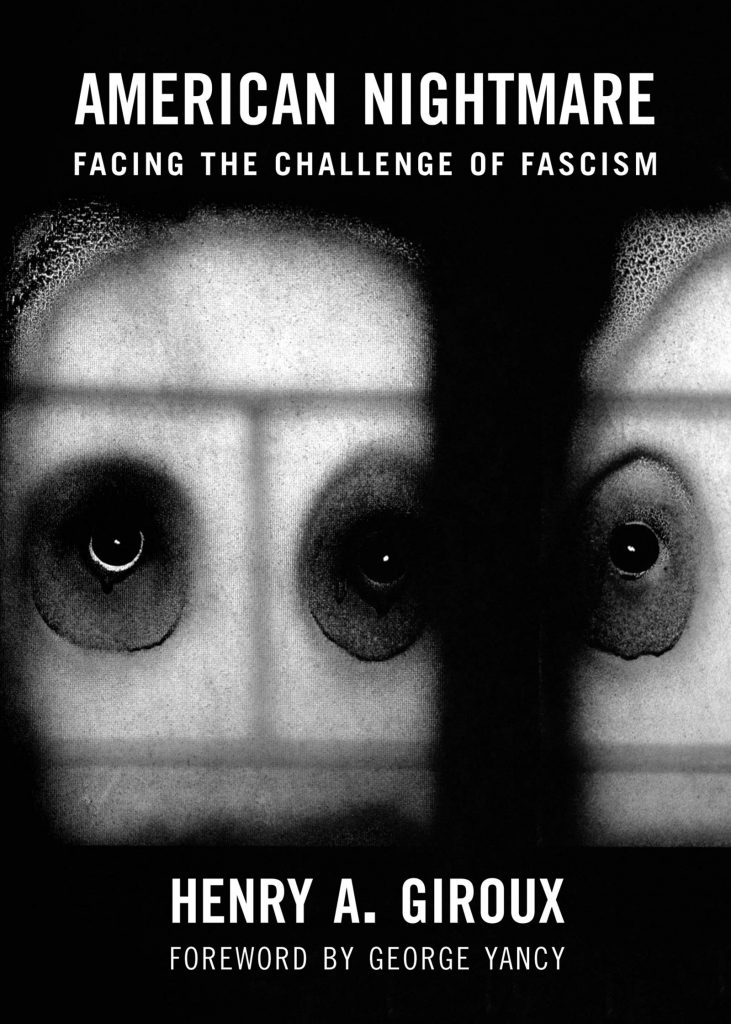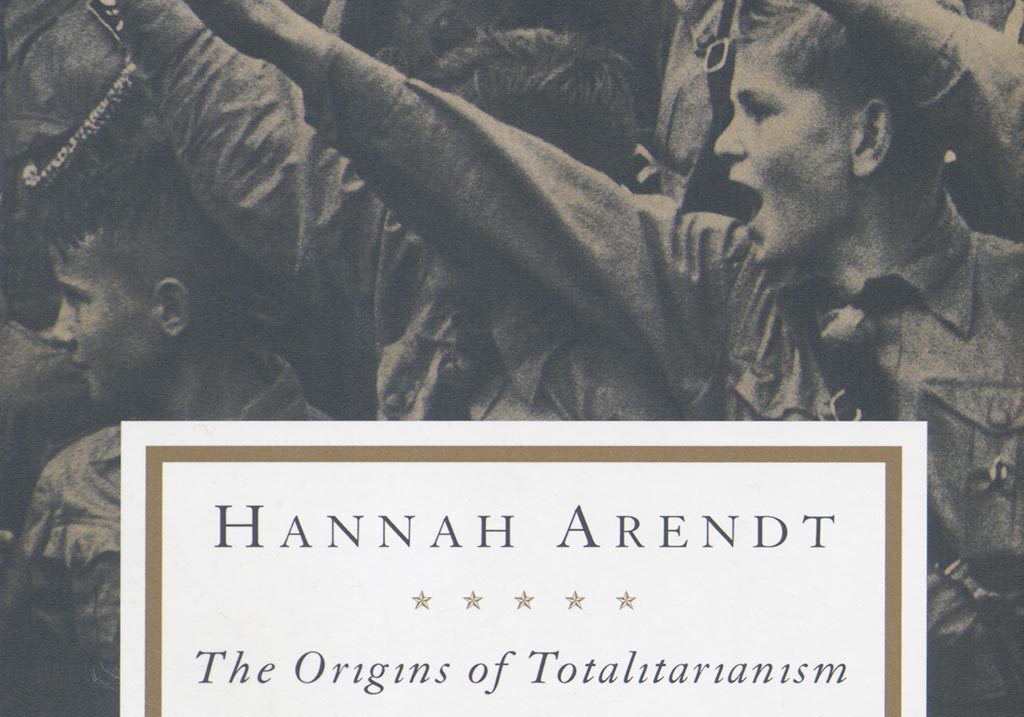It’s odd to read The Origins of Totalitarianism in the age of Trump. Arendt goes to great lengths to underscore the fact that (at least at the time of writing) totalitarian leaders had arisen only twice in human history—Hitler and Stalin—in part because she is quite stringent in her criteria for identifying totalitarianism. Always, as we are reading, we ask ourselves: does Trump meet these criteria? Could he in the near future? Trump could be a lot of things, an authoritarian leader, a strong man, a Fascist, a dictator, and still not take the U.S. over the totalitarian brink.
There is at least one way in which the U.S. has outstripped both Nazi Germany and Stalinist Russia. In discussing the precursors to totalitarianism, Arendt devotes much attention to colonialism and Imperial projects. Part of what makes totalitarianism a totalizing force is its aspiration to spread itself across the face of the Earth. It does not fear opposition because its endgame is total absorption of all peoples within a hegemonic mode of being wherein, semantically, opposition is impossible. This aspiration has its beginnings in the colonizing impulse and its subsequent empire-building projects. No country in history approaches the U.S. in terms of empire-building. Sometimes blatant: with military bases scattered across the globe, and endless war-mongering to secure resource extraction from “shithole” countries. Sometimes less obvious: with surreptitious operations by the CIA and other clandestine forces, and, perhaps most perniciously, with the overwhelm of its cultural domination through the poisonous Disneyfication of everything. I say pernicious because the subtle incursion of U.S. Culture into our thinking functions as what Henry Giroux calls a “disimagination machine.” Ironically, this is the very opposite of what Disney claims to be doing. The result is a totalizing world view, something neither Hitler nor Stalin could have hoped for when they came to power.
There are other ways, too, in which Trumpism echoes what has gone before. For example, the use of federal troops to control domestic conduct (i.e. blurring the lines between the functions of army and police), first in June when Trump used the National Guard to clear a path fro him from the White House to St. John’s Church, and then in July when he deployed forces to quell Black Lives Matter protests in both Portland and Seattle. Arendt makes much of the fact that because totalitarianism aspires to world domination, there is no border to protect, no foreign interests to secure, and so the army is functionally meaningless. All that matters is policing (although with military grade tools). I have written at greater length about this in a blog post remembering the 50th anniversary of Trudeau’s invocation of the War Measure Act.
There is the creation of stateless people, stripping people of their legal status, rounding them up, holding them in camps, turning them into refugees, deportations. Trump has especially demonized Hispanic people with his campaign promise to build a wall, stepped-up ICE renditions, deportation of Dreamers, children in cages.
There is Trump’s obvious—almost homoerotic—affinity for political strongmen, despots, dictators, people like Erdogan, Putin, Kim Jong Un, and el-Sisi. It’s very much reminiscent of the fondness Hitler and Stalin expressed for one another, and it lines up neatly with Mary Trump’s observation that everything Donald Trump does ultimately rests upon his pathological need for approval from his sociopathic (and thankfully dead) father.
Or there is his contempt for the press. Everything is “fake news.” He routinely denies access to mainstream media outlets, favouring the fawning sychophantic (excuse the “h”; I almost wrote “psychophantic”) forums of Fox and Breitbart.
Then, of course, there is his contempt for the truth. Daniel Dale has documented more than 20,000 public statements issuing from Trump’s lips that are outright lies. I’m not sure if I read it in Arendt, or in Giroux commenting on Arendt, but the lie functions not simply as a loyalty test; rather, through its repetition it reshapes reality and forecloses even the possibility of contradiction. It’s a little like Orwell: if you expunge certain things from your thought world (e.g. basic assertions of truth) then soon you make it impossible for people to give expression to the terms of their freedom.
There is a temptation to treat Arendt like the American Psychiatric Association’s DSMV: if an authoritarian leader meets enough of the documented criteria, then we can diagnose him with the political disease called totalitarianism. We can subject the process to the rigours of science. Unfortunately, that situates us on a fault line that runs through The Origins of Totalitarianism.
First published in 1951, the book is a creature of its time. That is not a criticism; it could not be otherwise. That means the book assumes things that one could almost say floated on the air in post-war America, all but invisible. With the passage of 70 years, these invisible things begin to take solid shape. What was assumed can no longer pass before our eyes without piquing our attention. So, for example, in her discussion of Imperialism, we have this surprising sentence:
What separates them [English nationalists] from later racists is that none of them was ever seriously concerned with discrimination against other peoples as lower races, if only for the reason that the countries they were talking about, Canada and Australia, were almost empty and had no serious population problem.
Notwithstanding her emigration to America, Arendt shared a Western European blind spot which led her, in an anti-racist discussion, to make a statement which today would be understood as arising from systemic racism. Four pages later, she refers to America and Australia as places “without a culture and a history of their own.” This does not invalidate her work, but it does signal that we should proceed with caution.
More pervasive, and perhaps more difficult to measure, is the positivist tone of the book. We find hints of it in grand pronouncements and sweeping generalizations that get tossed off with the force of scientific laws. Thus:
The most radical and the only secure form of possession is destruction, for only what we have destroyed is safely and forever ours.
Or:
Every full-fledged ideology has been created, continued and improved as a political weapon and not as a theoretical doctrine.
Or:
Rootlessness is characteristic of all race organizations.
These epigrammatic statements are delivered with confidence and certainty. I may well endorse them, but they are nevertheless dangerous in the context of a discussion about totalitarian leaders who deliver epigrammatic statements with confidence and certainty. Arendt cannot help herself. She is, after all, a modernist. Her consciousness is governed by reason, science, logic, algorithmic thought. This is the central conundrum of offering up a political critique: we share with our opponents the fundamental materials of consciousness. Even as we order those materials to articulate our objections, the forces we rail against seize some of those materials and erase them or render them impotent.
So, for example, people rail against Trump when he refuses to heed the advice of epidemiologists, when he uses an osteopath as his primary caregiver when he contracts Covid-19, when he makes outrageous statements about the spread of the virus. People say he denies the facts, that he spits in the face of reason, that he is deaf to the claims of science—as if these observations somehow matter.
Critics want the language of science. What Trump speaks and what his base craves is what Henry Giroux calls “the language of prophetic scientificality.” He doesn’t offer verifiable assertions. Instead, he defers verification of his assertions to a utopian future. In a couple of days 15 cases “is going to be down to close to zero.” “It’s going to disappear. One day, it’s like a miracle—it will disappear.” “We have it totally under control. … It’s going to be just fine.” He speaks to what Arendt identifies as “the needs of masses who had lost their home in the world and now were prepared to be reintegrated into eternal, all-dominating forces which by themselves would bear man, the swimmer on the waves of adversity, to the shores of safety.”
In the end, there is nothing about this that has to make sense, not even its analysis.
American Nightmare: Facing the Challenge of Fascism, Henry Giroux (San Francisco: City Lights, 2018)

This makes an excellent supplement to Hannah Arendt’s The Origins of Totalitarianism. As you read Arendt, you repeatedly find yourself asking: does this apply to Trump? or is there something different about the contemporary context that makes it impossible to draw the connection? Giroux examines the contemporary context (the first 18 months or so of Trump’s presidency) and reassures that you aren’t crazy; Arendt does apply. The U.S. may not be a totalitarian state (yet) but Fascism is most definitely knocking at the door.
One passage in particular is eerily prescient and deserves special note. After a long litany of budget cuts to social welfare and health spending (in order to fund military spending and tax cuts to the wealthy), Giroux writes:
The curbing of environmental regulations, biomedical research, and other vital public investments will result in the spread of diseases, failure to develop cures for many illnesses, and the spectre of major health and environmental disasters that will take an egregious toll on human life, especially for those who are the most vulnerable.
Although this is principally a critique of the Trump administration, Giroux hasn’t much regard for the Democrats either, following the lead of Chris Hedges who regards them as a coterie of shallow neoliberal shills who favour plutocrats and bloated military budgets at the expense of the middle class (and everyone else below them on the socio-economic ladder). From Giroux’s perspective, a choice between Democrats and Republicans is a false choice.
Unfortunately for Giroux, he is a social democrat and there is no party in the U.S. which represents his interest. If he lived in Canada, he would probably be a member of the NDP which, in our context, is largely viewed as a reasonable option rather than a commie plot. But there is no equivalent in the toxic arena that is U.S. politics. That is one of the problems facing the U.S. electorate in the upcoming election. However, because the problem is an absence, it may be difficult for many U.S. voters to know that the problem exists much less articulate what it is.
